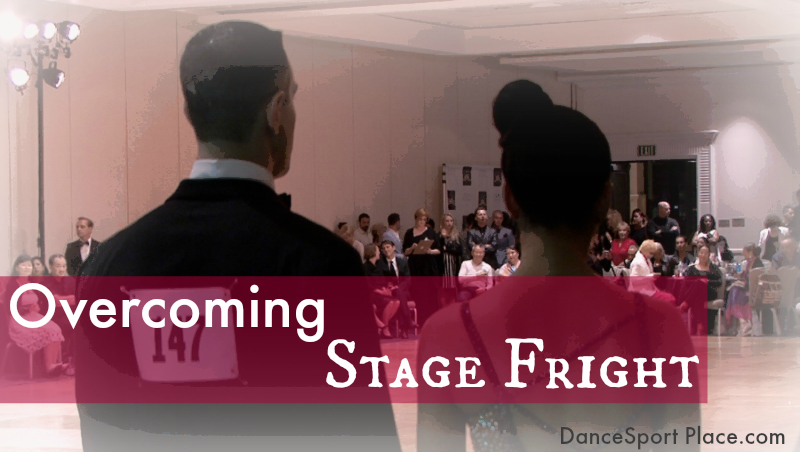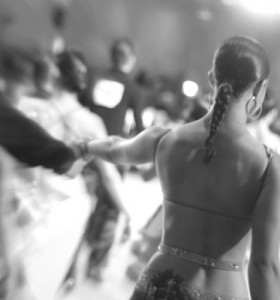My heart is pounding. It feels like goldfish are doing bellyflops in my stomach. I’m shifting in my shoes, can’t stay still. Gotta keep moving. Everything seems so much more real, more VIVID. I can feel my breathing. I can sense the people around, even the energy in the atmosphere…OMgosh, S%*t! I can’t even remember the first step of my routine! I feel like a horse at the gate ready to race! Can I really do this? Oh YES, I can’t wait to do this!!!
Once I hit the floor, I take my place in the spotlight. This is where I feel myself, where I feel comfortable and REAL. All those pre-show jitters fade away as I focus on the performance and feeling the music, the partner, the floor, the audience.
That’s the thrill of performing and competition. That EXCITEMENT is the adrenaline-producing FORCE that creates excitement and vitality in a performance.
For most people, the feelings are similar. Nervousness turns to energy and at the end of it all, we feel ALIVE.
If you have stage fright, it never goes away. But then I wonder: is the key to that magical performance because of the fear? – Stevie Nicks
But for some people, the nerves can bloom into full-blown anxiety. A state of fear that can paralyze and ultimately erode confidence to the point of not being able to perform. If you’ve ever had real stage fright, it can be terrifying.
It doesn’t have to stop you from achieving your dreams, though. Overcoming stage fright takes awareness, and practice, but learning coping techniques will help you move past your fears and into success.
A common problem:
First off, know that you’re not alone. Having stage fright is sometimes temporary, appearing out of the blue even for the seasoned professional.
Sometimes it grows over the years to the point when, sadly, if left unchecked, a performer will decide to resign. However, even famous entertainers have been able to overcome stage fright and not allowed it to hinder their careers. For example, Donny Osmond, Barbra Streisand and Sir Laurence Olivier have all at some time in their careers been crippled by the condition.
I’ve had a very difficult time with stage fright; it undermines your well-being and peace of mind and it can also threaten your livelihood. – Renee Fleming
Whether temporary or chronic, you don’t have to give into the fear. From personal experience, I can tell you that taking deliberate steps can help you overcome.
Many years ago, I had a bout with severe stage fright about three years into my professional dance career. This phobia came out of nowhere, as I’d be performing (and loved it) since I was kid. I developed a fear so paralyzing, that I would actually have both physical symptoms (dry heaving before and after performance) beyond the mental symptoms of distress and confusion.
It was so debilitating that I began to think that I would never be able to continue my career as a dancer. I had to make a choice: to give in the fear and give up, or find a way to get over it.
Visualization: (the key to overcoming)
We dancers don’t hang up our shoes easily, right?! Well, even the fear of vomiting publicly right on the dance floor wasn’t enough of a deterrent for me to think of giving up.
I bought a book titled, The New Toughness Training for Sports: Mental Emotional Physical Conditioning from One of the World’s Premier Sports Psychologists, by James Loehr and learned the single most important key to overcoming stage fright: VISUALIZATION.
Besides my normal physical practice, I would do a mental practice session where I would visualize my performance EXACTLY how I would ideally like it to happen.
I also practiced this exercise with a round of competition music playing. I would visualize while listening to the round and include time between the dances to imagine changing places on the floor just like a real comp.
As simple as this process sounds, it was the key for me to be able to move beyond stage fright. In the beginning of this process, I often would visualize mistakes or feel the fear I had during actual performance, but eventually through PRACTICE would overcome this.
Choosing your Battles
I also become very aware of others factors that I could and could not control during a performance. (DSP coach Jason Daly has a great video in our member library about this exact subject.)
What I could control, I PREPARED for. The ones I could not control, I resigned to and IGNORED. Knowing there was nothing I could do about them other than be aware of this fact, helped me let go of worrying about them.
Control Factors: (things you have power over
Practice of the dances
Sounds easy enough, but any uncertainty in the choreography, unclarity with the partner or physical uncertainty amplified my fears. I had to be sure I KNEW what I wanted to do on the floor and that I had the SKILL behind it to accomplish it. Only putting the time in at the studio could fix that.
Costuming
Looking and feeling your best puts any doubts about your appearance to rest. Not only do you want to look good, but feel comfortable in your costuming. That includes fabrics that work with your body and being sure that your costume/hair is SECURE–no wardrobe malfunctions!
Physicality
Avoid caffeine and eat correctly in preparation for your event, so you are hydrated, energized and not suffering with digestive troubles. Also, train for ENDURANCE. If you begin to feel tired and fatigued, you are more likely to lose mental focus.
Mental attitude
Know WHY you are doing what you are doing. What your goals are and the purpose of why you are performing in public? When you know the benefits you’ll get from doing what you do, you’ll be less likely to let fear come in.
Fallback help during the performance
Your partner and coach should already know your working on overcoming stage fright. Have a relax “code word” that you can say to yourself or your partner can whisper to you between dances. Practice saying and hearing this word during your visualizations. If you’ve trained with a focus word, hearing it will ground you back to the task at hand.
Breathing is also critical to relaxation. Be sure to breathe during the dances, and of course, take some extra deep breaths between the dances.
Feed yourself with the audience energy. Seeing people enjoying your dancing and the warm energy they are sending can help you relax. Scout out where your coach is or fans are before the event so you can catch a reassuring look from them when you need it.
Uncontrollable Factors: (things you don’t have power over)
Other competitors
Unless you are a champion every time, there is always someone better then you. If seeing your competition beforehand makes you doubt yourself, stay on your own as much as you can until you’re on the floor. If you are experiencing stage fright at this point, keep your focus on competing against yourself for the best you can do.
The location
You might be too cold, too hot, the floor might be slick or sticky, the room might be empty or standing room only. These elements are not in your control. Remember all of your competitors are experiencing the SAME THING. The best you can do is plan for the unknown, such as bringing a warm-up, shoebrush, etc. to help yourself as much as possible for those unknown conditions.
Alternative Therapy:
For on-the-spot help, consider essential oils. Lavender oil is well-known for its calming properties. Simply apply a few drops to the temples, neck and bottom of the feet, or rub between your hands and inhale. You can order high quality certified pure therapeutic grade oil here.
Although alternatives are helpful, remember that to permanently overcome stage fright, the practice of visualization and being prepared with take time and diligent effort.
In my opinion, the only way to conquer stage fright is to get up on stage and play. Every time you play another show, it gets better and better. – Taylor Swift
Define your fear:
Some dancers are more fearful of doing shows, where being the only couple on the floor, all eyes will be on them. Others get nervous about competition, knowing they will be compared to the other couples.
Some dislike the coldness and lack of direct audience feedback from dancing on a stage, while others are timid of the feeling of exposure on a lit floor, seeing their audience and their reactions as they dance.
Where does your fear lie? It’s crucial to define EXACTLY what causes your fear and address it during your visualization practice.
Overcoming stage fright takes work. When you tackle the problem head on, you will not only overcome it, but probably even improve your performance in the process. Fear cannot stop you!
- Write your Dance: Improve your dancing through journaling - November 12, 2019
- The Difference Between Oversway and Throwaway: Ballroom Video Preview - June 8, 2018
- Principles of Movement: Ballroom Basics Video - September 21, 2016





